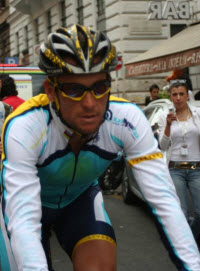 Seven-times champion Lance Armstrong admitted next year’s Tour de France could offer victory opportunities to a bigger field of rivals after the organisers’ unveiled the 2010 route on Wednesday.
Seven-times champion Lance Armstrong admitted next year’s Tour de France could offer victory opportunities to a bigger field of rivals after the organisers’ unveiled the 2010 route on Wednesday.
Beginning in Rotterdam on July 3 and ending in Paris July 25, the 97th edition of the world’s toughest bike race will cover an approximate total distance of 3,590 kilometres.
In total there will be one prologue, nine flat stages, six high mountain stages and four medium mountain stages.However in keeping with the organisers’ annual bid to innovate, there will be only three mountaintop finishes, only one individual time trial and no team time trial.
Spaniard Alberto Contador, who races for Astana, triumphed for the second time in his career in this year’s edition in which Armstrong finished third, behind Luxembourg’s Andy Schleck.
Armstrong and Contador both raced for Astana in 2009 however their cohabitation was far from comfortable. The American has since moved on and will spearhead the RadioShack team’s yellow jersey bid in 2010.
In total there are six full mountain stages in 2010, meaning there will be, at least on paper, plenty of opportunities for attacking drama in the Alps and Pyrenees.
But with only three summit finishes — and the most difficult sections of climbing in the Pyrenees — Armstrong hinted that he would be in with a good chance of controlling the threat of Contador.
“I think it will be much more open than this year. The TTT (team time trial) eliminated people (in 2009), and we won’t have that again,” said Armstrong.
“This year we ended up with three or four guys who could have won the Tour, next year we’ll be going into the tough sections with 10 guys.”
Armtrong, who ended his three-and-a-half year retirement last year to come back and compete for the first time since 2005, said he would have to study all the climbs “in detail” before making any pre-race plans.
But he hinted that the inclusion of downhill finishes on some of the climbing stages would give him, and others, opportunities to make up time on some of the pure climbers, such as Contador.
“There’s more downhill finishes, and also more long sections after the climbs. Those stages are almost non-events,” added the American.
Heading clockwise around France the peloton’s first big challenge will be the flat sections leading the race out of Rotterdam down north-eastern France, with incursions onto the dreaded cobblestones that usually feature on the Paris-Roubaix one-day classic on stage three.
It is on that kind of terrain, treacherous at best and made even worse by the rain, that the big yellow jersey contenders will be keen to avoid mishap.
“There are some risky elements in the Netherlands and Belgium where we must be careful not to lose unnecessary time,” said Schleck.
After racing through the hilly Jura region, the Tour goes on to the Alps where the first of the three summit finishes is at Morzine-Avoriaz on stage eight.
The big battles for the race’s coveted yellow jersey, however, will not kick off until the Pyrenees.
Beginning with the stage 14 ride from Revel to Ax-3 Domaines ski station, the race will then cross over the Tourmalet summit twice in two days — 100 years after the race first went over its most famous summit.
It will be crested during stage 16, then host the stage finish the next day – only the second time the Pyreneean climb has done so, and the first since 1974.
Considered the creator, and executor, of many a champion in the past – it is already getting Contador excited about his chances.
Brushing off suggestions that Armstrong is his main rival, the Spaniard who has won all three majors, Tour of France, Italy and Spain, said: “This Tour is better for me than last year, especially with a stage finish atop a climb so difficult as the Tourmalet.
“If I have good legs, I can take out a lot of time in the mountains going into the final time trial.”
As Armstrong struggled to produce the kind of climbing pace that often killed off his rivals during his seven-year reign, Andy Schleck this year showed authentic glimpses of his yellow jersey potential.
Despite the relative lack of summit finishes, the Luxemburger – a mediocre time trialler – believes the 2010 mountain stages will be tough.
“It looks like the route is harder than this year’s Tour and I could get a better chance of winning time in the mountains and lose less time on the long time trial,” said Schleck.
“I’m going for the overall victory next year but it’s clear that Contador is the biggest favorite while Lance may be more motivated than ever.”